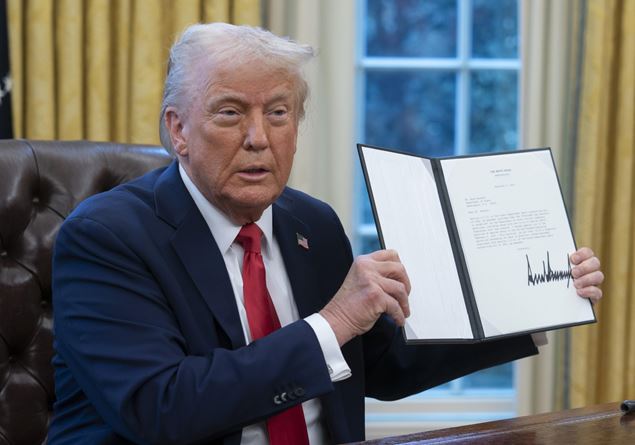
The economist Andrea Monticini.
The Wall Street Journal The most stupid commercial war in the history of the world economy called it “. Is this really the case?
“I would not use so drastic terms,” explains Andrea Monticini, professor of financial econometry at the Catholic University of Milan. “But it is certainly difficult to identify tangible advantages for the United States in a commercial war conducted in this way and with these reasons”.
In economics, Dazio calls Dazio, a kind of equal and contrary response. Who advises Trump in these economic choices? Is there a group of experts behind this strategy?
“I would not talk about an idea, of a structured strategy. First of all, it is necessary to understand what the purpose is. If the purpose is to report the production of various goods within the United States, it is clear that these duties must be perceived as permanent. It means that they must last at least 30 years and therefore they will also have to be shared by the future presidents of the United States, when there is no longer Trump. Because only a structural protectionist policy pushes and pushes companies to bring its production, its plants to the United States ».
The first recipients of Trump’s duties are Mexico and Canada. But it seems that now we are going to negotiation.
«So we do not speak of structural duties, but, let’s say, flexible and therefore temporary. And if they are temporary it is evident that they are taken a bit like a possible shock, but still destined to be recovered over a short time. And therefore they will produce absolutely nothing, except for a few jolts on the financial markets. Because a little volatility, however, without a doubt. So what credibility do Trump’s duties have? Does the president use them as a negotiating weapon and then remind them or does it actually want to impose them to bring the productions back to the United States? This is the question that we have not yet answered ».
The new tenant of the White House claims that the duties will also serve to reduce the American deficit. Can it work?
«No, the orders of magnitude are too different. The American deficit is enormous, while the revenue deriving from the duties would be negligible in comparison. It is not a sustainable strategy ».
On a geopolitical level, what consequences is this protectionist policy generate?
«The United States are denying their commercial policy of the last two centuries – that of free trade – hitting historical allies such as Canada and Mexico. All this creates instability and pushes Europe – another historic Atlantic ally – towards greater integration to increase its negotiating power. If the union is not sprove, it will reappear further. In addition, he will be pushed to divert his traffic to China. Which is exactly the opposite of what American interests should be ».
Towards Europe Trump has threatened, but not yet imposed, duties. If it were to do it, what would be the consequences?
«The reaction of Europe would be inevitable: to defend itself, it would impose retaliation duties on American products. In this scenario, global trade would contract, penalizing both the United States and their partners. A threat that becomes more and more credible. It is clear that it is again another eventuality that harms the United States, rather than bringing them benefits ».
From a technical point of view, what is the impact of this commercial war?
«In economic terms, duties create inefficiency and recession: they increase production costs, reduce competitiveness and brake the growth of world GDP. Companies based on exports are affected directly, while consumers face higher prices and a lower variety of goods. Ultimately, the level of general well -being decreases ».
Trump does not consider these repercussions, given that the affected countries will respond blow by blow, indeed duty on dice?
«In Trump’s entourage there are numerous people related to Wall Street and therefore they could recommend it in the right direction. Instead, the imposition of the duties, which turned into a negotiation with Mexico and Canada, went on ».
Are there any precedents of such tight commercial wars?
«In the last 50-60 years, world trade has followed a path of progressive liberalization. There was no return to protectionism on this scale for decades. Globalization, until a few years ago, seemed an irreversible process. Now we are witnessing a turnaround, which can have unpredictable consequences ».
Can central banks intervene to mitigate the negative effects of the duties?
«No, their action margin is limited. They can defend the exchange rate, but cannot counteract commercial barriers that directly influence production and consumption. The damage of the war of duties inevitably reflect on the well -being of people, and to pay the highest price are always the weakest ».
And Italy? How much would you get back from this commercial war?
“Very. Italy has a commercial surplus with the United States of around 42 billion euros in 2023. Among the most affected sectors there would be the pharmaceutical one, with an export of 8 billion towards America. If these products were burdened by duties, they would be purchased less, reducing production and increasing unemployment in our country ».






